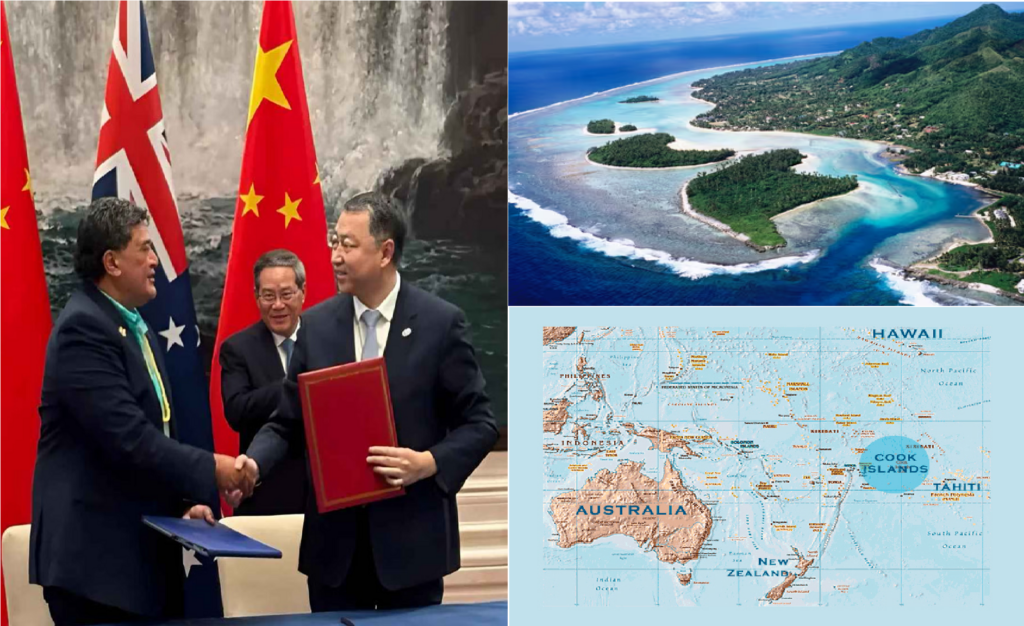
- China has been spreading its economic influence because of increasing domestic industrial demand and has looked for nations with abundant essential resources, and the Cook Islands perfectly serve that purpose.
- The region has historically been dominated by Australia, New Zealand, and the US and by establishing its presence, China is offering an alternative under the pretext of economic growth and investment.
- Demonstrations have been held in the Cook Islands, with opposition figures blaming Prime Minister Mark Brown for signing an agreement that will undermine national sovereignty.
- While Chinese investments can provide much-needed economic growth and development, it is also fraught with geopolitical and economic dangers of being sucked into a dependency trap or being pulled too far into China’s orbit of influence.
In February 2025, the Cook Islands agreed to a strategic economic cooperation agreement with China. The agreement aims at trade, investment, tourism, and cooperation on environmental affairs. The step, however, adds further obstacles for regional competitors such as Australia and New Zealand, which are not so keen on China’s increasing footprint on the Australian continent. The agreement between the Cook Islands and China also occurs at a time when Chinese influence in the region has been growing, with nations such as the Solomon Islands and Kiribati already deepening relations with Beijing. This has further changed the power dynamics in the Asia-Pacific region.
Why Is China Interested?
On the surface, this deal does not look big, considering that the Cook Islands has only a population of 17,000. Yet what makes this deal so intriguing is that the Cook Islands possesses a huge Exclusive Economic Zone (EEZ) and is also a seamount of seabed mineral deposits, especially polymetallic nodules. These nodules have high levels of rare earth elements, which are highly important for defence and electronics. China has, in the recent past, been spreading its economic influence because of increasing domestic industrial demand. China has always looked for nations with abundant essential resources, and the Cook Islands are just that for China.
In addition to that, there are also several geographical advantages for the Cook Islands. It is situated in the Asia-Pacific and along important maritime lanes, which provides China considerable strategic advantage. Even though the China-Cook Islands agreement has not reached a formal security pact, China has been on record making advance soft agreements in the name of strategic security cooperation, as evidenced in the Solomon Islands and Kiribati.
What Does China Gain?
China is not just looking at the geopolitical benefits of the Cook Islands but also aims to gain influence in regional politics. The main idea behind this move is to interfere in the regional geopolitical dynamics, as the Australian continent and the surrounding region have historically been dominated by Australia, New Zealand, and the United States. By establishing a presence, China is offering an alternative under the pretext of economic growth and investment.
But China is providing a competing model—one where Pacific nations receive investment and development agreements without political strings that frequently come attached with Western allies. One of the most significant advantages for China is the possible growth in trade and supply lines. With its strategic location, the Cook Islands facilitate easier access to resources and logistics centres in the Pacific for China. Though this agreement doesn’t touch on military cooperation, history has taught us that economic arrangements sometimes graduate into more strategic partnerships, providing opportunities for future development.
In addition to hard power, this deal also enhances China’s soft power in the Pacific. By building infrastructure, climate resilience, and tourism, China positions itself as a dedicated development partner, becoming an advocate for small nations that can feel neglected by traditional Western nations. Numerous Pacific countries have found themselves disappointed with sluggish aid from the likes of the U.S. and Australia, so China’s assertive policy is growing ever more attractive.

What Are Other Nations Doing?
Not surprisingly, this pact has drawn the attention of regional powers. New Zealand, which enjoys a constitutional link with the Cook Islands, was taken aback by the accord. Wellington’s leaders have voiced concern that they were not approached before the agreement was made, fearing that China’s expanding influence would erode New Zealand’s traditional relations with the Cook Islands.
Domestically, the agreement has caused political upheaval. Demonstrations have been held in the Cook Islands, with opposition figures blaming Prime Minister Mark Brown for signing an agreement that will undermine national sovereignty. A motion of no confidence has been tabled against him, as fears mount that too close an alignment with China will result in economic reliance—a concern that has been experienced in other Pacific countries.
In the background, Australia and the U.S. are taking close note. Both nations have stepped up their diplomatic push into the Pacific region to push back against China’s increasing presence. The U.S. has reinstated embassies in the region and more economic partnerships, while Australia has boosted its Pacific aid and security initiatives. Evidently, China’s expansion in the area isn’t passing without challenge, and the potential for increased rivalry over influence in the Pacific hangs in the air.
Conclusion
This agreement can cause a lot of issues for the Cook Islands. While on the one hand, Chinese investment can provide much-needed economic growth and development, it is also fraught with geopolitical and economic dangers of being sucked into a dependency trap or being pulled too far into China’s orbit of influence. The Cook Islands is now treading a thin line, attempting to gain the advantage of this arrangement without overstepping and falling into traps. It must all the while take into consideration how this action will influence its relationship with Australia, the de facto leader of this region, and whether it jeopardizes established relations.
References:
- https://www.thehindu.com/news/international/new-zealand-must-reset-cook-islands-ties-after-china-pact-foreign-minister-says/article69236921.ece
- https://www.rnz.co.nz/news/top/542268/cook-islands-government-releases-details-of-deal-with-china
- https://www.usip.org/publications/2024/10/kiribatis-president-wins-reelection-what-does-it-mean-us-and-china
- https://www.lowyinstitute.org/publications/geopolitics-pacific-islands-playing-advantage
Aayush Pal is a freelance writer on contemporary geopolitical developments. The views expressed in his work are entirely his own.
